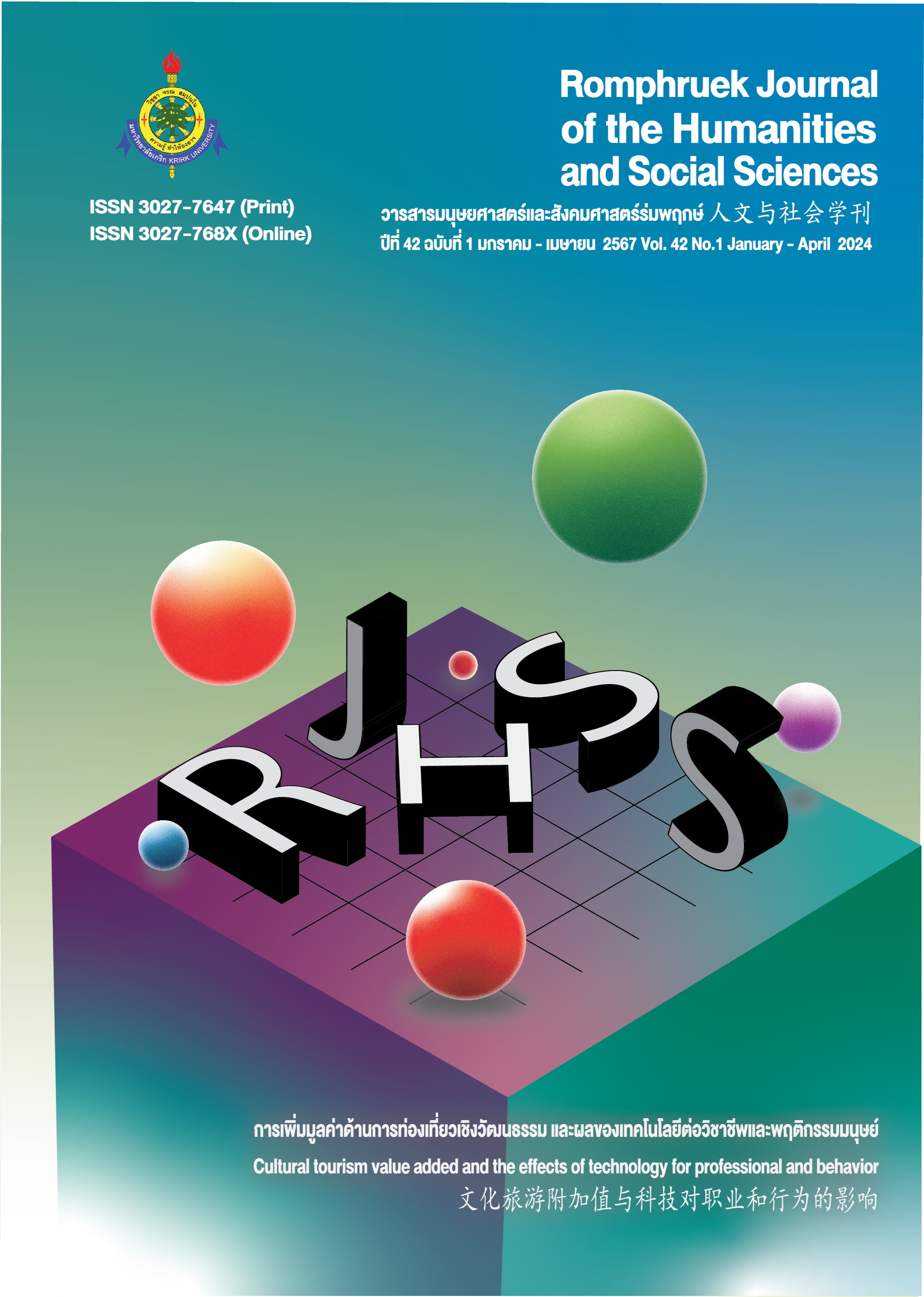温瑞安武侠小说改编的电视剧《布衣神相》人物爱情观分析
Main Article Content
บทคัดย่อ
“布衣神相系列”武侠小说是大陆新武侠代表温瑞安的代表作,被改编为多部影视作品。本文研究目的是了解小说改编的电视剧《布衣神相》中人物的爱情观,了解影视剧作者对不同种类爱情的态度,以及分析爱情因素在影视作品中的作用。采用的理论是爱情三元理论和电影叙事理论,研究方法是找出影视作品中各个人物和爱情有关的细节,通过爱情三元理论进行分析,总结出每个人物的爱情观。研究结论是赖药儿和嫣夜来的爱情以及沈绛红和柳焚余的爱情属于完满的爱情,求死和尚和苗小玉的爱情属于迷恋式爱情,项少影和茹小意的爱情是从愚蠢式爱情变为完满式的爱情,李布衣和叶梦色的爱情是喜欢式爱情,李布衣和若兰的爱情属于浪漫式爱情,沈星南和米纤的爱情属于空洞式爱情,白青书和江壁玲之间并不是彼此喜欢对方,只是白青书单向的爱。影视作品通过塑造不同种类爱情的结局,歌颂了完满爱情的幸福,讽刺了封建礼教束缚下的爱情,使人物个性更加鲜明,增加了故事情节的曲折性和冲突性,使影视作品更加贴近真实的生活,还推进了故事情节的发展。
Article Details

อนุญาตภายใต้เงื่อนไข Creative Commons Attribution-NonCommercial-NoDerivatives 4.0 International License.
ทุกบทความที่ตีพิมพ์ในวารสารมนุษยศาสตร์และสังคมศาสตร์ร่มพฤกษ์เป็นทัศนะและข้อคิดเห็นของผู้เขียนมิใช่ทัศนะของมหาวิทยาลัยเกริกหรือกองบรรณาธิการ การนำบทความส่วนใดส่วนหนึ่งหรือทั้งหมดไปพิมพ์เผยแพร่ต้องอ้างอิงที่มาให้ชัดเจน
เอกสารอ้างอิง
小佳.(1996).后新派武侠大师温瑞安. 中华武术,15(09), 46-48.
Xiao Jia (1996). Wen Rui'an: The Grand Master of the Post-New School of Martial Arts Fiction. Chinese Wushu, 15(09), 46-48.
王灿.(2011).谈新武侠小说的多元价值. 洛阳师范学院学报,30(10),47-49.
Wang Can. (2011). On the Multiple Values of the "New Swordsman Novel". Journal of Luoyang Normal University, 30(10), 47-49.
方忠.(1998).台湾武侠小说的历史流变. 台湾研究,12(01), 84-89.
Fang Zhong. (1998). The Historical Evolution of Taiwan Martial Arts Fiction. Taiwan Studies, 12(01), 84-89.
乐妍鹭 & 李凤萍.(2018).从爱情三元理论解析《永别了,武器》中的爱情模式.戏剧之家,28(29),222-223,231.
Le Yanlu. & Li Fengping (2018). Analyzing the love patterns in "Farewell to Arms" from the perspective of the triangular theory of love. Home Drama, 28(29), 222-223,231.
刘国辉.(2017).谁是英雄——温瑞安的热血武侠人生. 苏州教育学院学报,34(04),44-52.
Liu Guohui. (2017). Who is the Hero: Wen Rui’an’s Passionate Martial Arts Life. Journal of Suzhou College of Education, 34(04), 44-52.
网易(2022年12月7日).倪匡:现代中国武侠小说,只剩温瑞安一人在独撑大局. 网易公司版权所有.https://www.163.com/dy/article/GOM4VJQC0543L370.html .
NetEase. (2022,Dec.7). Ni Kuang: In modern Chinese martial arts fiction, only Wen Rui'an remains to hold up the fort alone. NetEase. https://www.163.com/dy/article/GOM4VJQC0543L370.html. [in Chinese].
陈大为.(2013).神州诗社:马华文学的江湖传说. 外国文学研究,36(06),57-65.
Chen Dawei. (2013). The Divine Land Poetry Society: Brotherhood’s Legend of Malaysian Chinese Literature. Foreign Literature Studies, 36(06), 57-65.
张永慧.(2012).借鉴与超越——电影《四大名捕》的互文性解读. 电影评介,34(20),44-45.
Zhang Yonghui. (2012). Learning from and Surpassing Predecessors: An Intertextual Analysis of the Film "The Four". Movie Review, 34(20), 44-45.
李京飞.(2010).温瑞安武侠小说的文体实验.(硕士学位论文, 重庆师范大学). 中国知网 https://kns.cnki.net/KCMS/detail/detail.aspx?dbname=CMFD2011&filename=2011011968.nh
Li, J. (2010). The Martial Arts Fiction Writing Experiment of Wen Rui-an. (Master’s thesis, Chongqing Normal University).CNKI. https://kns.cnki.net/KCMS/detail/detail.aspx?dbname=CMFD2011&filename=2011011968.nh.
肖婉莹.(2018).“盲约”能让你脱单吗——爱情三元理论视角下《盲约》中的现代都市职业女性婚恋观透视. 大众心理学,37(02),28-29.
Xiao Wanying. (2018). Can Blind Date Help You Find a Partner: A Perspective of Triangular Theory of Love on the Perspective of Modern Urban Professional Women's Marriage View in "Blind Date". Popular Psychology, 37(02), 28-29.
周正猷 & 唐洁清.(2017).爱情三元素理论的初步研究. 中国性科学,26(12),124-127.
Zhou Zhengyou & Tang Jieqing (2017). Preliminary study of the three element theory of love. Chinese Journal of Sexology, 26(12), 124-127.
郑保纯.(2004).武侠文学的历程与大陆新武侠的复兴——兼论《今古传奇·武侠版》.(硕士学位论文, 华中师范大学).中国知网.https://kns.cnki.net/KCMS/detail/detail.aspx?dbname=CMFD202201&filename=2004083011.nh.
Zheng, B. (2004). The Development of Chivalry Novel and the Newest Achievement of the New Chivalry Novel in China’s mainland.(Master’s thesis, Central China Normal University). CNKI.https://kns.cnki.net/KCMS/detail/detail.aspx?dbname=CMFD202201&filename=2004083011.nh
范雅婷.(2019).斯滕伯格三元理论视域下的热播剧《延禧攻略》的女性观众婚恋观分析报告. 传播力研究,4(23),72.
Fan Yating. (2019). Analysis report of female audience's view of love and marriage in the popular TV series "Story of Yanxi Palace" from the perspective of Sternberg's Triangular Theory of Love. Research on Transmission Competence,4 (23), 72.
周瑜.(2014).《四大名捕》影评赏析. 大众文艺,59(06),183-184.
Zhou Yu. (2014). Appreciation and Analysis of the Film "The Four". Popular Literature and Art, 59(06), 183-184.
赵牧.(2004).侠义精神与中国想像——论温瑞安早期的诗文创作. 台湾研究集刊,22(03),
-99.
Zhao Mu. (2004). The Spirit of Chivalry and Chinese Imagination: On the Early Poetry and Prose of Wen Rui'an. Taiwan Research Quarterly, 22(03), 95-99.
胡荣丽.(2010).从爱情三元理论简析《蜗居》中人物的爱情类型. 商业文化(学术版),17(10),357-358.
Hu Rongli. (2010). An Analysis of Love Types of Characters in "Dwelling Narrowness" from the Perspective of Love Triangles Theory. Business Culture (Academic Edition), 17(10), 357-358.
高河金.(2007). “大陆新武侠”研究. (硕士学位论文, 暨南大学).中国知网. https://kns.cnki.net/KCMS/detail/detail.aspx?dbname=CMFD202201&filename=2007192211.h
Gao, H. (2007). Study on the New Chivalry Novels in China’s mainland. (Master’s thesis, Jinan University). CNKI. https://kns.cnki.net/KCMS/detail/detail.aspx?dbname=CMFD202201&filename=2007192211.nh
贾茹 & 吴任钢.(2008).论罗伯特·斯腾伯格的爱情三元理论. 中国性科学,17(03),10-12,46.
Jia Ru & Wu Rengang. (2008). Studies Robert J Sternberg’s triangular theory of love. The Chinese Journal of Human Sexuality, 17(3), 10-12,46.
韩云波.(2005).论90年代“后金庸”新武侠小说文体实验. 重庆大学学报(社会科学版),11(04),71-75.
Han Yunbo. (2005). On the Genre Trial of "Post-Jin Yong" New Chivalry Fictions in 1990s. Journal of Chongqing University (Social Science Edition), 11(04), 71-75.
董焱.(1996).台湾新派武侠走笔. 中华武术,16(06), 37-39.
Dong Yan. (1996). Taiwan's New-style Wuxia Writing. Chinese Wushu, 16(06), 37-39.
温瑞安.(1996). 内容提要. 谢日新(责任编辑.广州花城出版社.
Wen Rui'an. (1996). Executive summary. In Xie Rixin (Ed.). Guangzhou Huacheng Publishing Press.
蔡晓晴.(2020).用爱情三元论简析《傲慢与偏见》中的婚恋观. 青年文学家,21(29),101-102.
Cai Xiaoqing. (2020). Analysis of Marriage and Love View in Pride and Prejudice from the Perspective of Triangular Theory of Love. Young Writers, 21(29), 101-102.
鲜跃勇 & 刘雪梅.(2014).从爱情三元理论简析徐志摩的爱情类型. 青年文学家,15(11),166.
Xian Yueyong & Liu Xuemei. (2014). Analyzing Xu Zhimo's love types from the perspective of the love triangle theory. Youth Literator, 15(11), 166.
Amporn Srisermbhok (2016) The Golden Bowl; The Great Artist’s View on Marriage: Henry James and The Golden Bowl. Humanities and Social Sciences, 33(3), 1-17.
Pichamon Wannachat & Santad Kaewlam (2021) Presenting Points of views of Male Homosexuals’ Love: A Case of the “Duan Keaw Duan” Novel Series. Narkbhutparitat Journal Nakhon Si Thammarat Rajabhat University,13(2), 76-91.
Suyada Channart (2017).Concept of Love from Irving Singer’s Perspective. Panidhana : Journal of Philosophy and Religion, 13(1), 160-182.


